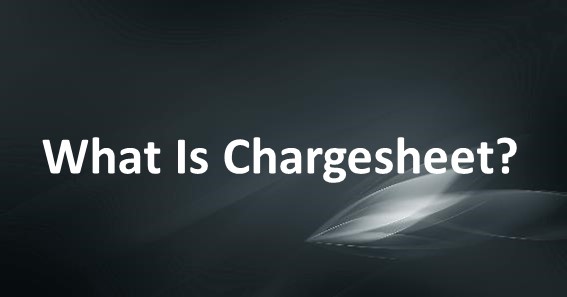Are you curious to know what is chargesheet? You have come to the right place as I am going to tell you everything about chargesheet in a very simple explanation. Without further discussion let’s begin to know what is chargesheet?
A chargesheet is a crucial document in legal proceedings that serves as an essential tool for the prosecution to present its case against an accused individual or entity. It outlines the specific charges and allegations levied against the accused, providing a comprehensive summary of the evidence and legal basis for the case. In this blog, we will delve into the concept of a chargesheet, its contents, the process of filing it, and its significance in the legal system.
What Is Chargesheet?
A chargesheet, also known as a charge sheet or a police report, is a formal document prepared by the investigating authorities (usually the police) after conducting an investigation into an alleged criminal offense. It acts as the foundation for the subsequent legal proceedings and serves as the basis for the trial.
Contents Of A Chargesheet:
- Details of the Accused: The chargesheet begins by identifying the accused individual(s) or entity, including their personal information such as name, address, and any relevant identification details.
- Description of the Offense: The chargesheet outlines the specific criminal offense(s) allegedly committed by the accused. It provides a detailed narrative of the events, including the time, date, and location of the incident.
- Sections of the Law: The chargesheet references the relevant sections of the law under which the accused is being charged. These sections specify the nature of the offense and the corresponding penalties if convicted.
- Evidence and Witnesses: The chargesheet includes a summary of the evidence collected during the investigation, such as physical evidence, documents, forensic reports, and witness statements. It also lists the witnesses who may be called upon to testify during the trial.
- Legal Basis: The chargesheet outlines the legal reasoning behind the charges, referring to specific provisions of the law that establish the elements of the offense and support the prosecution’s case.
Filing And Review Process:
The chargesheet is typically filed by the investigating officer with the relevant court or judicial authority. It is then reviewed by the prosecutor, who evaluates the strength of the case based on the evidence presented. The chargesheet may undergo revisions or additions based on legal scrutiny or subsequent developments in the investigation.
Significance Of The Chargesheet:
- Formalizing the Accusation: The chargesheet formalizes the allegations against the accused, providing a clear and specific statement of the charges. It ensures that the accused is aware of the nature of the offense and can prepare an appropriate defense.
- Ensuring Fair Trial: The chargesheet plays a vital role in ensuring a fair trial by providing the accused with the opportunity to know and respond to the allegations and evidence presented against them. It forms the basis for the legal proceedings, allowing both sides to present their arguments and evidence.
- Establishing Legal Basis: The chargesheet outlines the legal basis for the case, referencing the relevant sections of the law. It enables the court to assess the validity of the charges and ensures that the prosecution is adhering to the principles of due process and legality.
- Guiding the Trial: The chargesheet serves as a guide for the trial proceedings, outlining the scope and boundaries of the case. It helps structure the presentation of evidence, examination of witnesses, and arguments made by both the prosecution and the defense.
Conclusion:
The chargesheet is a critical document in legal proceedings, serving as the foundation for the prosecution’s case against the accused. It provides a comprehensive summary of the charges, evidence, and legal basis, ensuring transparency, fairness, and adherence to the principles of justice. Understanding the significance of the chargesheet helps individuals involved in legal processes comprehend their rights and responsibilities, fostering a more informed and just legal system.
FAQ
What Happens If Charge Sheet Is Filed?
The purpose of a charge-sheet is to notify a person of criminal charges being issued against them. After the charge-sheet is filed, the person against whom the charge-sheet has been filed comes to be known as an accused. The filing of charge-sheet with the magistrate indicates commencement of criminal proceedings.
What Is A Chargesheet In Law?
What is a Chargesheet? About: A chargesheet, as defined under Section 173 CrPC, is the final report prepared by a police officer or investigative agency after completing their investigation of a case.
Why Do Police File Chargesheet?
On the basis of the investigation, the police are required to form an opinion. If the police think that the evidence points to the guilty of the accused person, then they file a chargesheet in the court. It is not the job of a police to decide whether a person is guilty or innocent, that is for the judge to decide.
What Is Difference Between Charge Sheet And Fir?
An FIR is a report that gets to the police first, either orally or in writing. A chargesheet is a key document that indicates the crime has been committed.
I Have Covered All The Following Queries And Topics In The Above Article
Maximum Time Limit To File Chargesheet
Police Charge Sheet Procedure
What Happens After Chargesheet Is Filed By Police
Types Of Charge Sheet
How To Challenge Chargesheet
Can Police File Chargesheet Without Evidence
How To Know If Chargesheet Is Filed
What Is Chargesheet
What does charge sheet mean
What is a chargesheet?



